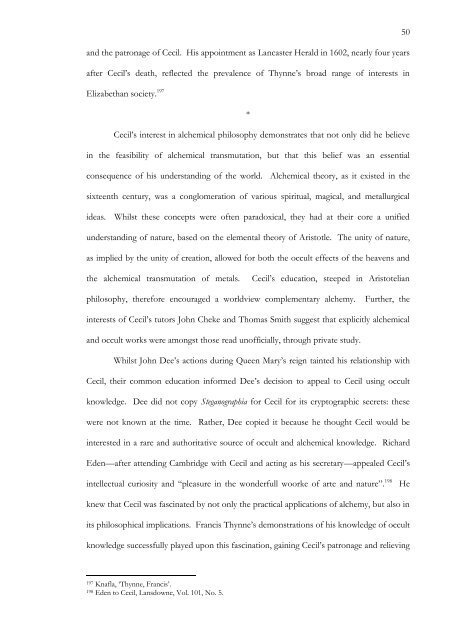The Alchemical Patronage of Sir William Cecil, Lord Burghley
The Alchemical Patronage of Sir William Cecil, Lord Burghley
The Alchemical Patronage of Sir William Cecil, Lord Burghley
Create successful ePaper yourself
Turn your PDF publications into a flip-book with our unique Google optimized e-Paper software.
and the patronage <strong>of</strong> <strong>Cecil</strong>. His appointment as Lancaster Herald in 1602, nearly four years<br />
after <strong>Cecil</strong>‘s death, reflected the prevalence <strong>of</strong> Thynne‘s broad range <strong>of</strong> interests in<br />
Elizabethan society. 197<br />
*<br />
<strong>Cecil</strong>‘s interest in alchemical philosophy demonstrates that not only did he believe<br />
in the feasibility <strong>of</strong> alchemical transmutation, but that this belief was an essential<br />
consequence <strong>of</strong> his understanding <strong>of</strong> the world. <strong>Alchemical</strong> theory, as it existed in the<br />
sixteenth century, was a conglomeration <strong>of</strong> various spiritual, magical, and metallurgical<br />
ideas. Whilst these concepts were <strong>of</strong>ten paradoxical, they had at their core a unified<br />
understanding <strong>of</strong> nature, based on the elemental theory <strong>of</strong> Aristotle. <strong>The</strong> unity <strong>of</strong> nature,<br />
as implied by the unity <strong>of</strong> creation, allowed for both the occult effects <strong>of</strong> the heavens and<br />
the alchemical transmutation <strong>of</strong> metals. <strong>Cecil</strong>‘s education, steeped in Aristotelian<br />
philosophy, therefore encouraged a worldview complementary alchemy. Further, the<br />
interests <strong>of</strong> <strong>Cecil</strong>‘s tutors John Cheke and Thomas Smith suggest that explicitly alchemical<br />
and occult works were amongst those read un<strong>of</strong>ficially, through private study.<br />
Whilst John Dee‘s actions during Queen Mary‘s reign tainted his relationship with<br />
<strong>Cecil</strong>, their common education informed Dee‘s decision to appeal to <strong>Cecil</strong> using occult<br />
knowledge. Dee did not copy Steganographia for <strong>Cecil</strong> for its cryptographic secrets: these<br />
were not known at the time. Rather, Dee copied it because he thought <strong>Cecil</strong> would be<br />
interested in a rare and authoritative source <strong>of</strong> occult and alchemical knowledge. Richard<br />
Eden—after attending Cambridge with <strong>Cecil</strong> and acting as his secretary—appealed <strong>Cecil</strong>‘s<br />
intellectual curiosity and ―pleasure in the wonderfull woorke <strong>of</strong> arte and nature‖. 198 He<br />
knew that <strong>Cecil</strong> was fascinated by not only the practical applications <strong>of</strong> alchemy, but also in<br />
its philosophical implications. Francis Thynne‘s demonstrations <strong>of</strong> his knowledge <strong>of</strong> occult<br />
knowledge successfully played upon this fascination, gaining <strong>Cecil</strong>‘s patronage and relieving<br />
197 Knafla, ‗Thynne, Francis‘.<br />
198 Eden to <strong>Cecil</strong>, Lansdowne, Vol. 101, No. 5.<br />
50















